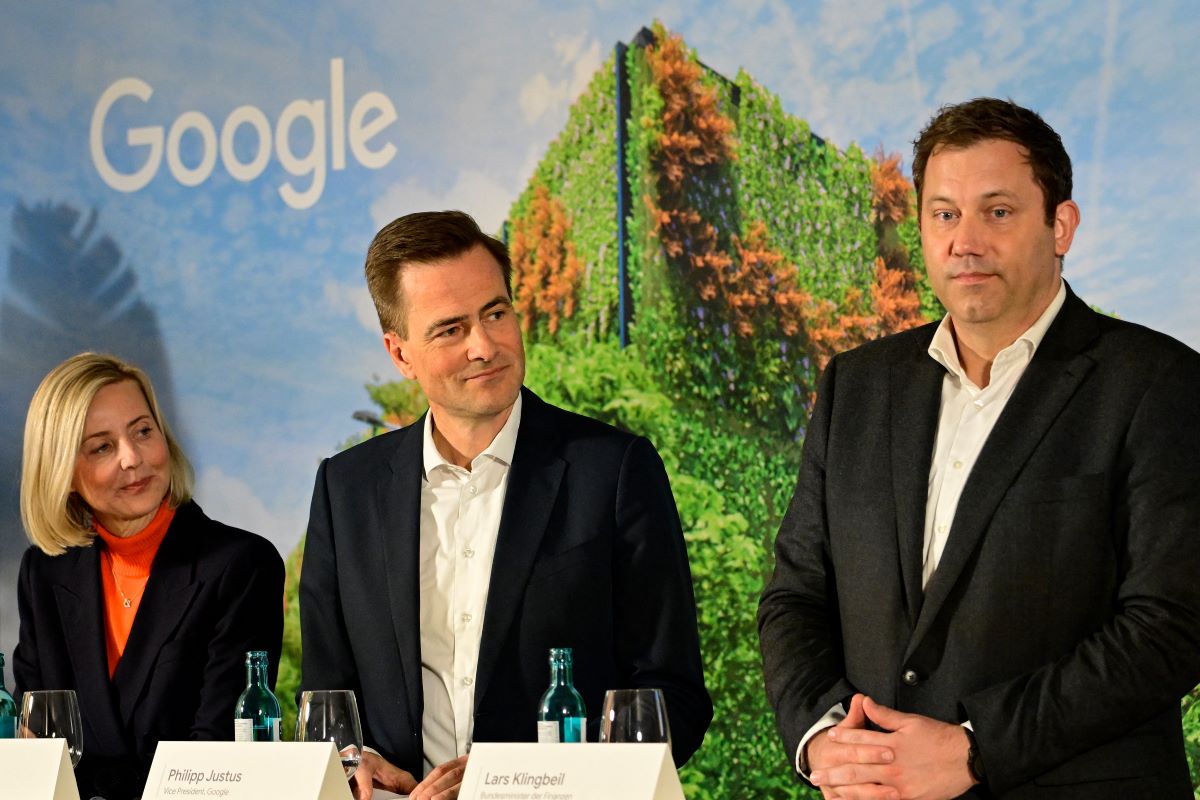Tech giant Google has unveiled its biggest-ever investment in Germany, pledging €5.5 billion for a new data centre and other projects. How many jobs will it create – and where?
Google’s mega-investment plan, announced on Tuesday, comes after AI chip juggernaut Nvidia and Deutsche Telekom last week announced plans for a high-tech hub in Germany aimed at helping industry speed up adoption of artificial intelligence.
The cash injections are a boost for Germany, whose economy is struggling, as well as Europe as it seeks to catch up with AI leaders the United States and China.
“We are driving growth in Germany,” said Chancellor Friedrich Merz of the CDU.
“Our country is and will remain one of the most attractive places for investment in the world,” he said.
How will it boost the job market?
Google, a subsidiary of US tech giant Alphabet, said the plans are “expected to secure around 9,000 jobs in Germany annually until 2029″. The project is scheduled to start in 2026.
The plans include building a new data centre in Dietzenbach, near Frankfurt, and expanding the US tech company’s existing facility in Hanau, both located in the central German state of Hesse.
Marianne Janik, vice president for Google Cloud in Northern Europe, told news agency Reuters that around 100 employees would be based in both Dietzenbach and Hanau.
“Google is deepening its roots in Germany, extending our investments in the country and creating new avenues for AI-driven transformation,” said Philipp Justus, Google’s country manager for Germany.

Marianne Janik, Vice President at Google Cloud for Northern Europe, Philipp Justus, Vice President at Google for Central Europe and German Vice Chancellor Lars Klingbeil at a press conference in Berlin on Tuesday. Photo by Tobias SCHWARZ / AFP
Google is also set to to invest more in its office presence in Munich, Berlin and Frankfurt.
For instance in Munich, where Google employs over 1,000 developers, a new facility is planned. Following the restoration and modernisation of the former parcel delivery office in the city’s Maxvorstadt district, the building complex will house a “state-of-the-art development centre with 30,000 square meters of office space” for up to 1,500 Google employees, the firm said.
READ ALSO: Which job sectors in Germany need the most skilled workers?
Once completed at the end of 2026, the project at the historic Arnulfpost will also create public areas that will be accessible to everyone.
The tech giant also outlined various projects aimed at reducing its greenhouse gas emissions.
These included buying renewable wind and solar energy and a “heat recovery project” that would see excess heat produced by a data centre re-used by local residents.
Boost digital sector
Merz’s coalition, which took power this year, is seeking to attract more foreign investment to boost the digital sector with prospects for the country’s traditional industrial titans increasingly bleak.
The recently unveiled Nvidia project involves a one-billion-euro investment for a computing hub in the southern city of Munich designed to enable European companies, from big industry players to start-ups, better access to AI.
Germany is quickly building up its data centres: by 2030, the country’s data centre computing power will increase by 70 percent, according to digital business association Bitkom.
Europe still lags far behind, however – as of last year the continent’s data centres had computing capacity of 16 gigawatts, compared with 48 in the US and 38 in China, according to the group.
READ ALSO: Two of Germany’s largest firms are sounding the alarm about an AI bubble
While the investments will be broadly welcomed in Germany as Merz seeks to reboot the economy, some are nevertheless concerned about the reliance on US tech giants in sensitive areas such as AI.
Increasingly uneasy ties between Europe and the US since President Donald Trump returned to power have fuelled calls for more “digital sovereignty” – meaning the region’s data should be stored at home, where European rules and norms apply, rather than handed to US firms.
READ ALSO: How German schools are including more and more AI
Google made a nod to these concerns on Tuesday, emphasising in its announcement that it offered “sovereign” cloud computing that allowed customers to adopt “AI capabilities, while adhering to local requirements and European values”.
Kristina Sinemus, a senior official responsible for digital affairs in Hesse, also played down concerns that working with US tech giants could threaten data security.
“We don’t automatically hand over all the data to the US with a US investor,” she said, stressing that agreements could ensure data was kept at home.
“We need to stop thinking in black and white terms, because it’s a bit more complex than that.”
With reporting by Rachel Loxton
Disclaimer : This story is auto aggregated by a computer programme and has not been created or edited by DOWNTHENEWS. Publisher: thelocal.de





